【2022中考英语一轮教材专题复习】外研七年级上册 Starter Modules 1-4 & Modules 1-5课件(共115张PPT)
文档属性
| 名称 | 【2022中考英语一轮教材专题复习】外研七年级上册 Starter Modules 1-4 & Modules 1-5课件(共115张PPT) | 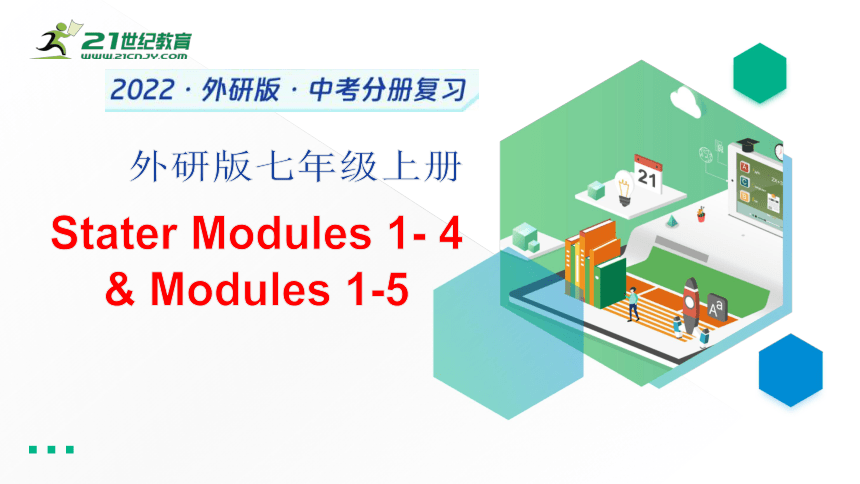 | |
| 格式 | pptx | ||
| 文件大小 | 3.8MB | ||
| 资源类型 | 试卷 | ||
| 版本资源 | 外研版 | ||
| 科目 | 英语 | ||
| 更新时间 | 2022-02-12 20:46:23 | ||
图片预览

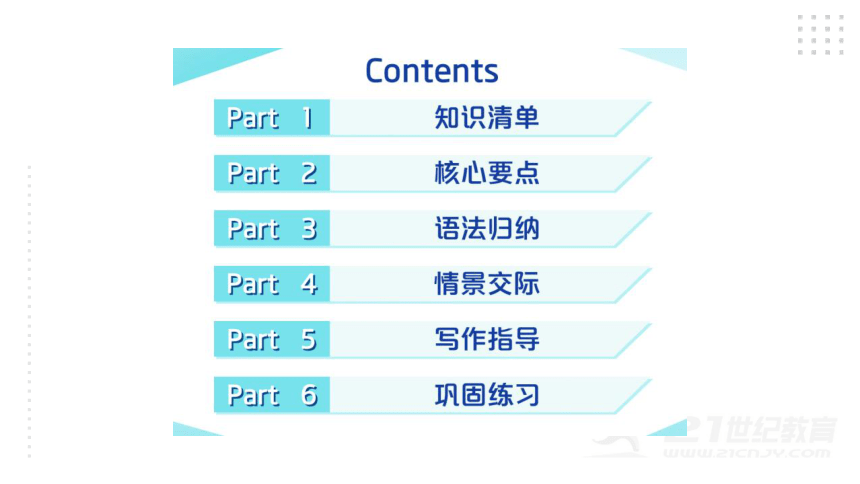
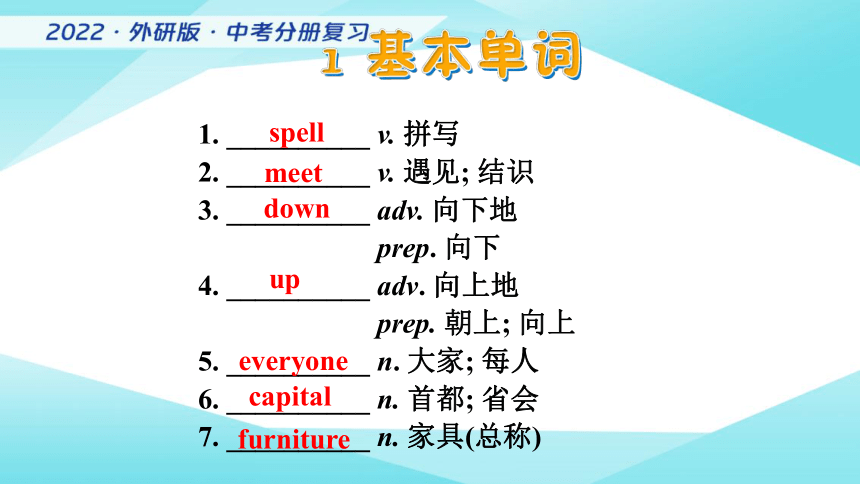
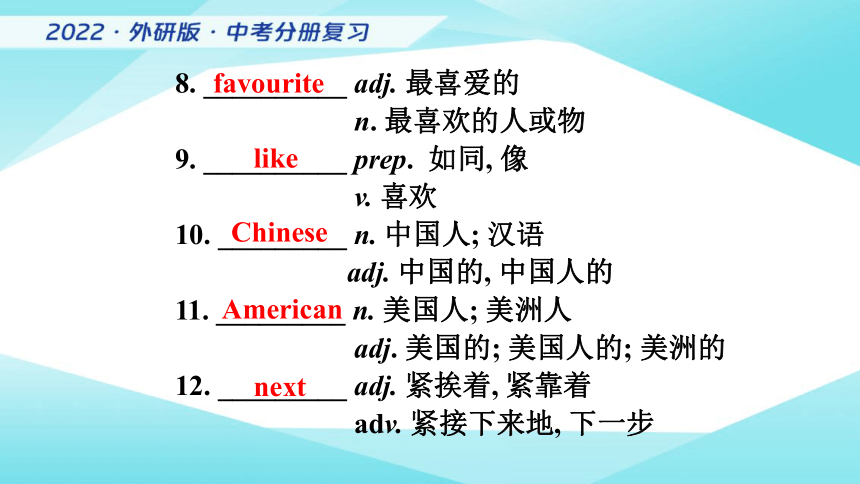
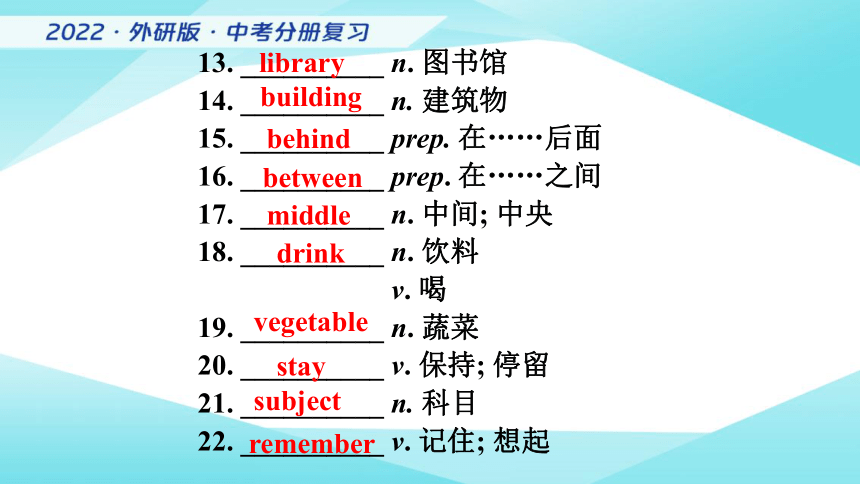
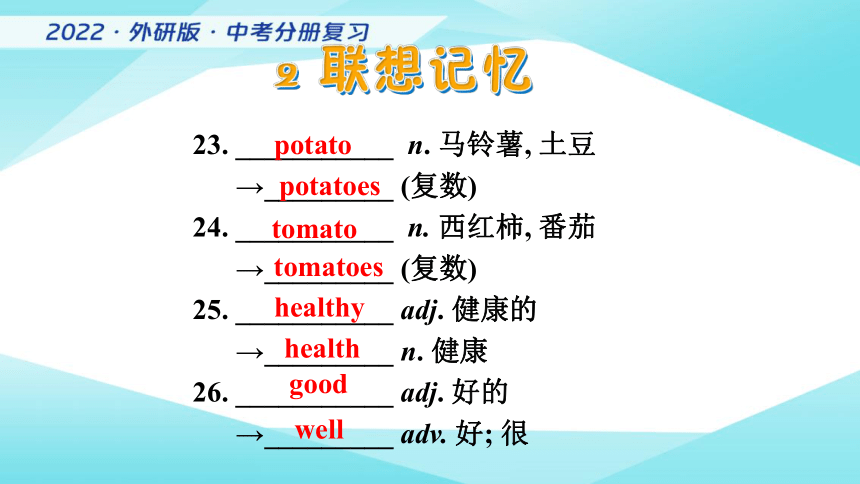
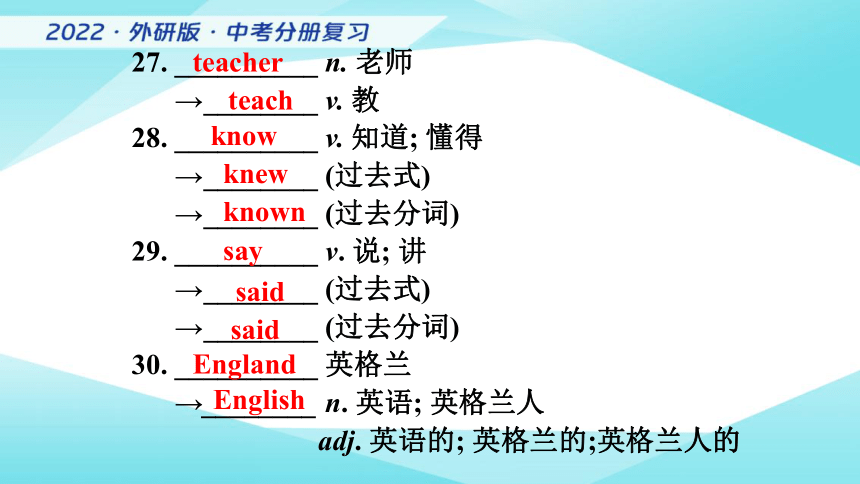
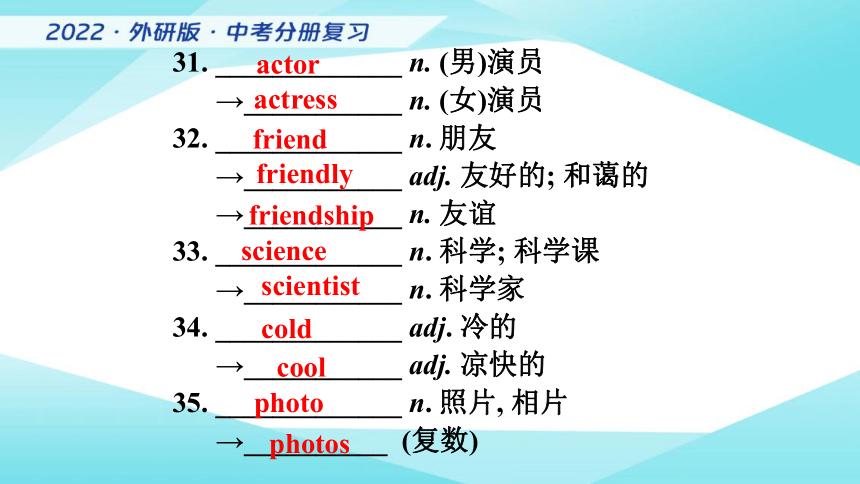
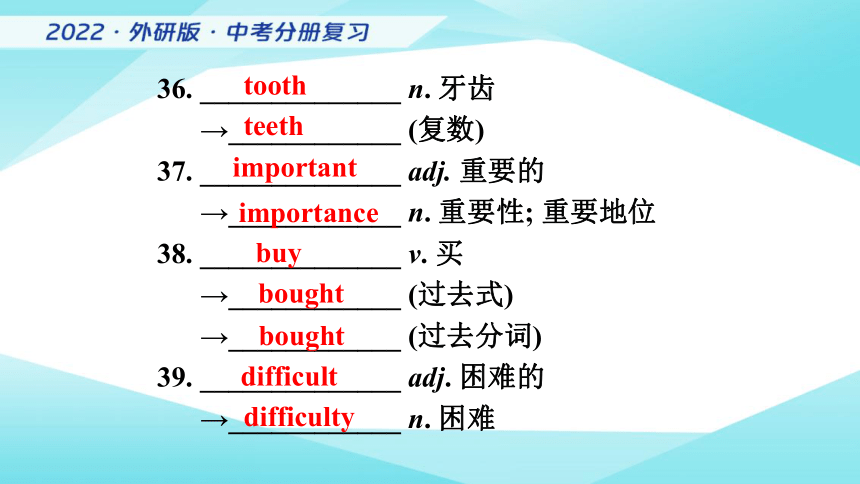
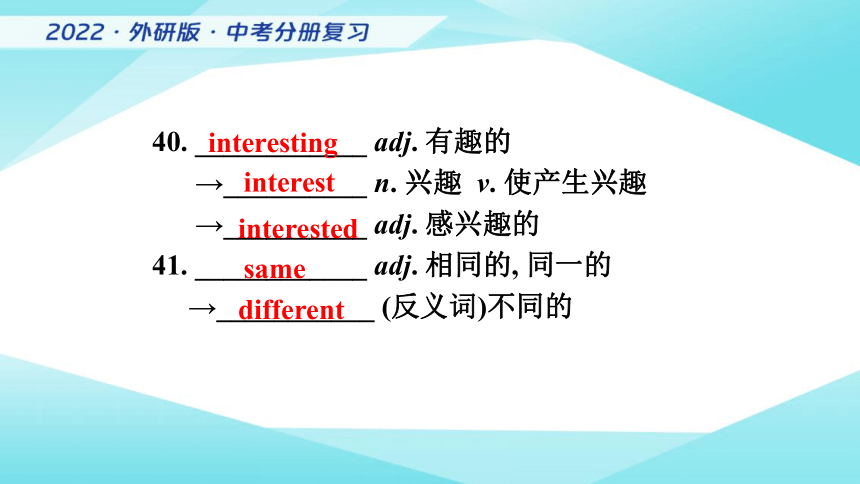
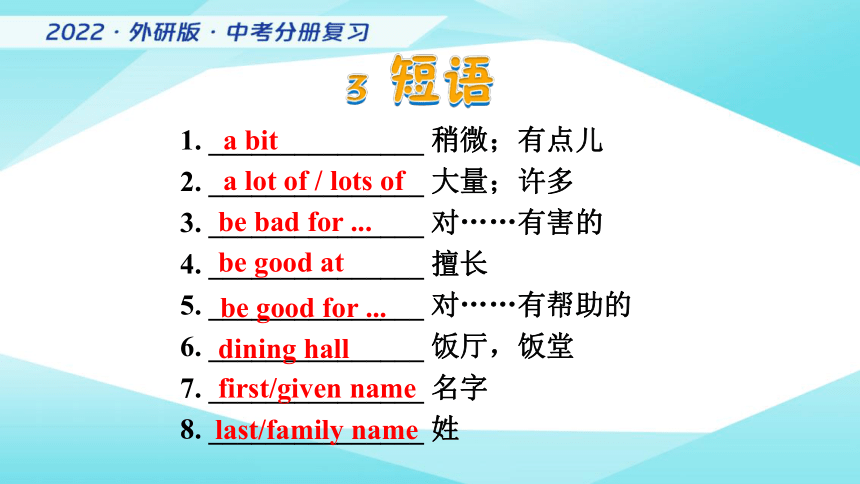
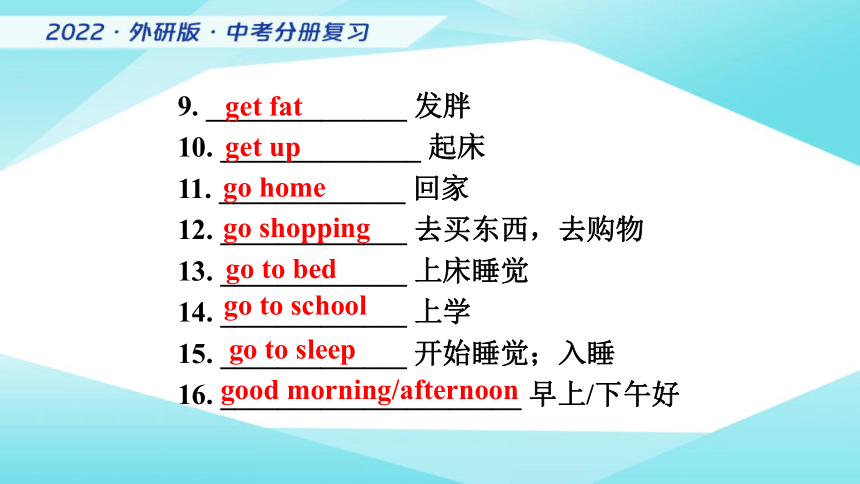
文档简介
(共115张PPT)
外研版七年级上册
Stater Modules 1- 4
& Modules 1-5
Presentation
1. __________ v. 拼写
2. __________ v. 遇见; 结识
3. __________ adv. 向下地
prep. 向下
4. __________ adv. 向上地
prep. 朝上; 向上
5. __________ n. 大家; 每人
6. __________ n. 首都; 省会
7. __________ n. 家具(总称)
spell
down
meet
up
everyone
capital
furniture
8. __________ adj. 最喜爱的
n. 最喜欢的人或物
9. __________ prep. 如同, 像
v. 喜欢
10. _________ n. 中国人; 汉语
adj. 中国的, 中国人的
11. _________ n. 美国人; 美洲人
adj. 美国的; 美国人的; 美洲的
12. _________ adj. 紧挨着, 紧靠着
adv. 紧接下来地, 下一步
favourite
like
American
Chinese
next
13. __________ n. 图书馆
14. __________ n. 建筑物
15. __________ prep. 在……后面
16. __________ prep. 在……之间
17. __________ n. 中间; 中央
18. __________ n. 饮料
v. 喝
19. __________ n. 蔬菜
20. __________ v. 保持; 停留
21. __________ n. 科目
22. __________ v. 记住; 想起
library
building
middle
behind
between
drink
vegetable
stay
subject
remember
23. ___________ n. 马铃薯, 土豆
→_________ (复数)
24. ___________ n. 西红柿, 番茄
→_________ (复数)
25. ___________ adj. 健康的
→_________ n. 健康
26. ___________ adj. 好的
→_________ adv. 好; 很
potato
tomato
health
tomatoes
healthy
potatoes
good
well
27. __________ n. 老师
→________ v. 教
28. __________ v. 知道; 懂得
→________ (过去式)
→________ (过去分词)
29. __________ v. 说; 讲
→________ (过去式)
→________ (过去分词)
30. __________ 英格兰
→________ n. 英语; 英格兰人
adj. 英语的; 英格兰的;英格兰人的
teacher
know
teach
knew
say
said
said
known
England
English
31. _____________ n. (男)演员
→___________ n. (女)演员
32. _____________ n. 朋友
→___________ adj. 友好的; 和蔼的
→___________ n. 友谊
33. _____________ n. 科学; 科学课
→___________ n. 科学家
34. _____________ adj. 冷的
→___________ adj. 凉快的
35. _____________ n. 照片, 相片
→__________ (复数)
actor
friend
friendly
friendship
actress
science
scientist
cold
cool
photo
photos
36. ______________ n. 牙齿
→____________ (复数)
37. ______________ adj. 重要的
→____________ n. 重要性; 重要地位
38. ______________ v. 买
→____________ (过去式)
→____________ (过去分词)
39. ______________ adj. 困难的
→____________ n. 困难
tooth
teeth
importance
bought
buy
important
bought
difficult
difficulty
40. ____________ adj. 有趣的
→__________ n. 兴趣 v. 使产生兴趣
→__________ adj. 感兴趣的
41. ____________ adj. 相同的, 同一的
→___________ (反义词)不同的
interesting
interested
interest
same
different
1. _______________ 稍微;有点儿
2. _______________ 大量;许多
3. _______________ 对……有害的
4. _______________ 擅长
5. _______________ 对……有帮助的
6. _______________ 饭厅,饭堂
7. _______________ 名字
8. _______________ 姓
a bit
a lot of / lots of
be bad for ...
be good at
be good for ...
dining hall
first/given name
last/family name
9. ______________ 发胖
10. ______________ 起床
11. _____________ 回家
12. _____________ 去买东西,去购物
13. _____________ 上床睡觉
14. _____________ 上学
15. _____________ 开始睡觉;入睡
16. _____________________ 早上/下午好
get fat
get up
go to school
go to bed
go home
go shopping
go to sleep
good morning/afternoon
17. _______________ (课间)休息一下
18. ___________________________
吃早 / 午 / 晚餐
19. ________________ 用英语
20. ________________ 在……的前面
21. ________________ 在……的中间
22. ________________ 在……旁边, 紧挨着……
23. _______________ 是的, 当然
have a break
have breakfast / lunch / dinner
in English
in front of ...
in the middle of ...
next to ...
of course
24. ______________ 在左边, 在左侧
25. ______________ 在右边, 在右侧
26. ______________ 坐下
27. ______________ 起立
28. ______________ 与某人交谈
29. ______________ 太多
30. ______________ 看电视
on the left
on the right
sit down
talk with / to sb.
too much
watch TV
stand up
1. Where are you from
2. What about you
3. Welcome to Class 4 Grade 7!
4. What a big family!
5. What’s your classroom in England like
6. How many students are there in your class in Beijing
7. Let’s go shopping for food and drink.
8. —How about some orange juice
—Yes, good idea!
9. It is important to remember: eat well, stay healthy, and don’t get fat!
10. —What are our lessons on Monday
—We have Chinese at eight o’clock and science at five to nine.
11. —Do you like maths, Tony
—Yes, I do. / No, I don’t.
12. It’s my favourite subject because it’s very interesting.
1. please int. 请
【归纳】
please是询问对方情况时常用的礼貌用语, 它可以放在句首, 也可以放在句末, 前面要有逗号和句子的其他成分隔开。
listen vi. 强调听的动作, 表示“听……”时, 常与介词to连用。
hear vt. 强调听的结果。
hear sb. do sth. 听见某人做了某事
强调听到的动作经常发生或已经完成;
hear sb. doing sth. 听见某人正在做某事
强调听到的动作正在进行。
2. listen & hear
【语境应用】根据句意用hear或 listen的适当形式填空。
1) ________! Who is talking in the room
2) Jerry is ________ to the teacher carefully in the classroom now.
3) I could ________ Lucy playing the guitar when I walked past her house.
4) I often _______ Miss Wu speak English.
hear
Listen
listening
hear
3. the art. 指已经谈到或正在谈到的事物
这(那)个。常和名词连用, 表示某个或某些特定的人或事物。
【常见用法】
1) 特指某人或某物。
2) 指谈话双方都知道的人或物。
3) 指世界上独一无二的事物。
4) 用于江、河、湖、海等专有名词或由普通名词构成的专有名词前。
【拓展】
不定冠词a/an的用法:
a用于以辅音音素开头的单词前。
an用于以元音音素开头的单词前。
1) As an old saying goes, “He who has never been to ______ Great Wall is not a true man.”(2021江苏盐城)
A. a B. an C. the D. /
2) Everyone needs to know ______ importance of rubbish sorting (分类). (2021成都)
A. an B. / C. the
C
C
3) This is ______ story of friendship. Let’s read ______ story together. (2021天津)
A. a; an B. an; the C. an; a D. a; the
4) —Who is ______ man in front of the post office
—The on with ______ umbrella He is out English teacher. (2021新疆)
A. the; a B. the; an C. a; an D. a; the
D
B
5) —What’s the most important tradition in Chinese family
—I think it’s to respect ______ old and love ______ young.
(山东菏泽)
A. an; the B. an; a C. the; the
C
4. help v. / n. 帮助;援助
help
help oneself (to)… 随便吃/喝……
help sb. (to) do sth. =
help sb. with sth. 帮助某人做某事
can’t help doing sth. 情不自禁做某事
with the help of sb. = with one’s help
在某人的帮助下
v.
n.
ask sb. for help = turn to sb.
向某人求助
【归纳】
【中考链接】
1) Boys and girls! Help y__________ to some fish.
(2019新疆)
2) 在我们的帮助下,小鸟终于回巢了。
______ ______ ______, the baby bird got back to its nest in the end. (2020广州)
yourselves
With
our
help
5. idea n. 想法, 主意 (可数名词)
【归纳】
an idea 一个主意
a good idea 一个好主意
复数形式 — ideas
【拓展】
I have no idea. = I don’t know.
我不知道。
like
短语
like+ v.-ing
like to do
like+n./pron.
喜欢做……(表示习惯性的动作)
喜欢做……(表示偶尔想做的事情)
对某事物的兴趣或爱好
6. like v. 喜欢; 喜爱
【归纳】
7. everyone pron. 大家; 每人
【归纳】
everyone=everybody(只能用来指人) everyone作主语时, 谓语动词用第三人称单数形式。
8. same adj. 相同的, 同一的
【拓展】
same
反义词
短语
交际用语
look the same 看起来一样
the same as 和……一样
at the same time 同时
the same age as… 和……同岁
The same to you. 你也一样。
Thanks all the same.仍然要谢谢你。
different adj. 不同的
【语境应用】完成句子。
1) 他们在同一所学校。
They are in ________ ________ ________.
2) 我们有不同的观点。
We have ________ ________.
3) Tom和我同岁。
Tom is the ________ age ________ me.
same as
the same school
different views
9. furniture n. 家具(总称) 不可数名词
【归纳】
作主语时, 谓语动词用单数形式。
【拓展】
家具的“量”, 可用much, little, a little, a lot of, lots of等修饰, 但不能用many, few, a few等修饰。
10. many adj. 许多, 很多
【归纳】
many修饰可数名词复数;much修饰不可数名词
二者均可与lots of或a lot of 互换。
how many 多少 (接可数名词复数, 用于对数量进行提问)
【语境应用】
新加坡Singapore一年有几个季节?
How many seasons are there in Singapore in a year
完成句子。
between 指两者之间, 宾语常是表示两者的名词或代词, 或者是由and连接的两个人或物。
among 常用于三者或三者以上:在……之间, 宾语通常是表示笼统数量或具有复数或集合意义的名词或代词。
11. between & among
【语境应用】用among或between填空。
1) He built a house _______ the trees.
2) John runs fastest _______ the students.
3) She is sitting ________ Lucy and Lily.
among
among
between
12. for prep. 为, 为了
【归纳】
for表示某一目的, 后接名词、代词或v.-ing等。
【拓展】
for的其他用法:
1) 由于; 因为
Thank you for your help.
2) 供……用的
The room is for four people.
3) 向, 往
He is leaving for Shanghai.
4) 对……来说
It’s time for me to go to school.
13. remember v. 记住;记起
【归纳】
remember
remember to do sth.
记住要干某事(事情没做)
remember + that从句
记住……;记得……
remember doing sth.
记得曾经做过某事(事情已做)
e.g. I remembered reading this novel, but I didn't remember to return it to the library.
【链接】
forget to do sth. 忘记去做某事
forget doing sth. 忘记做过某事
stop to do sth. 停下来去做某事
stop doing sth. 停下正在做的某事
regret to do sth. 做某事很遗憾
regret doing sth. 后悔做过某事
— John, remember _______ off the lights when you leave the classroom. (2019湖南湘西)
— No problem!
A. turn B. turned C. to turn
C
【中考链接】
将所给词语连词成句 ,标点已给出。 (2018 河北)
on time, to, remember, arrive __________________________________.
Remember to arrive on time.
1. on the wall(s) & in the wall(s)
on the wall(s) 指地图、画像等悬挂、张贴于墙上, 强调外物挂在墙上。
in the wall(s) 指窗户、门、洞、孔等 镶嵌入墙内。
2. a bit 稍微; 有点儿
【归纳】
用于修饰形容词或副词
a bit of =a little 一点儿 (修饰不可数名词)
e.g. a bit of water 一点儿水
3. get up 起床
【拓展】get短语:
get短语
get to 到达
get on 上车
get off 下车
get into trouble
陷入困境
get back 回来
get married 结婚
get ready for 为……做好准备
get on well with sb.
和某人相处融洽
【语境应用】根据汉语意思完成句子。
—你通常几点起床?
—What time do you usually______ ______
—我七点起床。
—I ______ ______ at seven o’clock.
get up
get up
1. This is Miss Zhou.
这是周老师。
把一个人介绍给另一个人:This is…。
this常指代距离较近的人或物, 与其相对的词是that。它们可单独使用, 也可用来修饰名词。
【拓展】
1) 介绍他人的句型:
That is… 那是……
This boy is… 这个男孩是……
That girl is… 那个女孩是……
2) 当一次介绍两个或多个人时, 要用其复数形式
These are… 近指
Those are… 远指
2. What day is it today
今天星期几?
用来询问星期几,是一个固定句型。其中it可以省略。
常用回答为“Today is …”或“It is … today”。
e.g. Today is Monday. / It’s Monday.
【拓展】
如果询问日期,则用“What’s the date today ”
e.g. -- What’s the date today
-- It’s November 25th.
3. What’s the weather like in summer
夏天的天气怎么样?
用来询问天气状况, 同义句是“How is the weather ”。回答常用“It’s + 描述天气的形容词(warm, hot, cool, cold…)”。
4. Let’s play football after school.
我们放学后去踢足球吧。
1) Let’s do sth. 让我们做某事吧
用于提出建议或征求对方意见。答语常用“OK./All right./Good idea!”等。
2) play和球类名词连用时, 中间不加冠词。与乐器名词连用时, 乐器名词前要加定冠词the。
【语境应用】单项选择
—Let’s ______ table tennis after school.
—Good idea.
A. play B. playing C. to play D. plays
A
5. Hello, what about you
你好, 你呢?
-- How about some orange juice
买些橙汁好吗?
-- Yes, good idea!
嗯, 好主意!
【归纳】
What about… ……怎么样?
=How about…
常用来询问对方的意见或看法。其后接名词、代词或v.-ing形式。
6. … what’s your classroom in England like
……在英格兰你的教室是什么样子的
What’s … like ……是什么样子的
也可以用来询问某人的性格特征
e.g. -- What’s your English teacher like
-- He is very serious.
7. What a big family!
省略了的感叹句,完整形式:What a big family it is!
基本句型结构:
What + a(an) + (形容词) +单数可数名词+主语+谓语!
e.g. 今天天气真好! (翻译)
What a fine day it is!
8. How many students are there in your class in Beijing
在北京你班上有多少学生
how many 多少, 引导特殊疑问句, 对可数名词的数量进行提问。
e.g. How many workers are there on the farm
一般现在时 (be动词/行为动词) (Module 1 &5)
时态 基本结构及时间标志词 一般现在时 结构 1. 主语+am/is/are
2. 主语+动词原形/动词单三形式
句式 1. 肯定句:
主语+动词原形 / 动词的第三人称单数+其他
2. 否定句:
主语+don’t / doesn’t +动词原形+其他
3. 一般疑问句:
Do / Does + 主语 + 动词原形 + 其他
肯定回答:Yes, 主语 (人称代词) + do / does.
否定回答:No, 主语 (人称代词) + don’t / doesn’t.
时态 基本结构及时间标志词 一般现在时 标志词 1. 频度副词:always, usually, often, sometimes, seldom, never, hardly
2. 频率词组:once a year, twice a month, three times a day等
3. 其他词组:on Sundays, at/on weekends, every day/year/...(every系列)
时态 常见用法及例句
一般现在时 1. 现阶段经常性、习惯性的动作,常与频度副词连用。
2. 现在的情况或状态。
e.g. She speaks Spanish.
3. 客观真理、客观存在或自然现象。
e.g. The earth moves around the sun.
4. 主将从现。用在以if, unless, as soon as, when, once, until等引导的时间状语从句和条件状语从句中,用一般现在时表示将来。
e.g. I will tell him the good news when he comes back.
5. 按计划或安排好将要发生的动作,一般现在时表将来,但仅限于start, begin, leave, go, come, arrive等词。
e.g. Our English class starts at three this afternoon.
代词 (I, he, she, my, his, her, you, your, it, our) (Module 1)
类别 人称 人称代词 物主代词 主格 宾格 形容词性 名词性
第一人称 单数 I me my mine
复数 we us our ours
第二人称 单数 you you your yours
复数 you you your yours
第三人称 单数 he him his his
she her her hers
it it its its
复数 they them their theirs
类别 用法 例句
主格 作主语,用在动词前 He played some amazing games.
宾格 作宾语,用在动词、介词后,表示动作行为的对象 He showed us some pictures of different places in China.
作表语,用在系动词后 —Who's the boy in the photo?
—It's me.
形容词性物主代词 作定语,用在名词前 He practised playing volleyball with his friend.
名词性 物主代词 作主语 This isn't your book. Yours is on the table.
当选项为人称代词I, you, she, he、物主代词my, your, her, his时,根据句子中的提示词或已给出的人称来判断空格处相应的代词。其中第一、二人称比较容易判断,第三人称的区分如下:
1. 若所填空指代的是题干中的lady, woman, mother, Miss, Mrs., sister, aunt, girl, madam等代表女士的词或Lily, Lucy等女孩名时,应用与she相关的词;
2. 若所填空指代的是题干中的gentleman, man, father, Mr., brother, uncle, boy, sir等代表男士的词或Jack, Tom等男孩名时,应用与he相关的词;
3. 若所填空指代的是题干中的some people, many students等表示第三人称复数的词时,应用与they相关的词。
指示代词this, these, that和those (Module 2)
常用的指示代词单数有this和that,复数有these和those。
this / these:
①近指。
e.g. This is Lisa's mobile phone.
These are their books.
②指下文要提到的事。
e.g. Please remember this: No pains, no gains.
that / those
①远指。
e.g. That's my father's computer.
Those are Susan's new books.
②指前面刚刚提到过的事或用来代替上文已提到的带定冠词的名词。
e.g. He was ill. That was why he didn't go to school.
The machines we use today are much better than those we used ten years ago.
打电话时用this介绍自己,用that询问对方。
e.g. This is Jerry speaking. Who's that
名词所有格 (Module 2)
类别 构成方法 示例
有生命的单数名词 加's with my father's help
有生命的 复数名词 以s结尾加' the teachers' office
不以s结尾加's children's homework
类别 构成方法 示例
表示时间、距离、国家等名词 单数加's China's development
复数加' ten minutes' walk
表示几个人共同拥有 在最后一个名词后加's Tom and Jim's room
表示每个人各自拥有 在每个名词后加's Mike's and John's desks
用以构成 不同的节日 加's或' Children's Day; New Year's Day
Teachers' Day; Women's Day
There be 的基本结构
There be +主语(人或物)+地点/时间状语
某处/某时有某人/某事物
There be 的用法
be动词必须和主语在人称和数上保持一致。
如果主语部分是两个或两个以上的并列主语时,be动词一般和邻近主语的数和人称保持一致:就近原则。
there be 句型 (Module 3)
e.g. There were two men in the store at that time.
There is an orange on the table.
There is an apple and two pears on the table.
There be句型的时态
时态 There be句型
一般现在时 There is/are...
一般过去时 There was/were...
一般将来时 There will be.../There is/are going to be...
现在完成时 There have/has been...
There be 的句式变化
肯定句 There is/are +主语+地点状语。 否定句 There isn’t/ aren’t +主语+地点状语。 There isn’t water in the bottle. 一般疑问句 Is /Are there +主语+地点状语? Is there any water in the bottle 肯定回答 Yes, there is/are.
否定回答 No, there isn’t/aren’t.
There be 句型 & have
There be 句型 表示某处存在某物或某人,不强调归谁所有;have表示某人拥有某物或某人,强调所属关系。
have 表示包括、存在时,可以与There be句型互换。
A week has seven days. =
There are seven days in a week.
表地点、位置的介词 (Module 3)
(in, on, behind, next to, in front of, near)
介词 用法 举例
in 在……之内:某一小地点在另一大地点之内 Guilin is in the north of Guangxi.
用于较大的地方前 (国家、城市、水域等) in China; in Beijing
介词 用法 举例
on 在……表面或在广阔的平面上 on the table
on the sofa
表示两地只是相邻或接壤,互不管辖 Canada lies on the north of America.
介词 用法 举例
behind 在……后面。用于指某人或某物在另一人或物的后面 The school is behind the gym.
next to 紧邻,在……旁边 用于指某人或某物紧挨着另一人或物 A lab is next to the library.
near 在……附近 near a bus stop
介词 用法 举例
in front of 指在物体外部的前面 There is a big tree in front of our classroom.
in the front of 指在物体内部的前面 There is a blackboard in the front of the classroom.
have / has got (Module 4)
have / has got 某人有某物 She has got a very nice bike.
have/has not got 某人没有某物 I have not (haven’t) got a god.
some, any (Module 4)
some和any都可修饰可数名词复数或不可数名词:一些……。
some 一般用于肯定句或表请求、建议的疑问句中 David has some friends in
Shanghai.
Can I have some chicken
any 一般用于否定句和疑问句中 Mary hasn’t got any pens.
Has Tom got any cola
可用于肯定句:任何的,任一的,常接可数名词单数。 Any shirt here is very good.
How many (Module 3)
可数名词复数形式 (Module 4)
一、可数名词
1. 可数名词有单数和复数两种形式。
2. 可数名词可被基数词(one),不定冠词(a, an)或these, those, all, some, many, several, few, a few, a lot of, lots of, enough, plenty of, a number of等修饰。
3. 对可数名词的量提问用how many。
There are ten books on the desk.
→How many books are there on the desk
条件 变化形式 例词
一般情况 +-s shops, desks, bags
以s, x, ch, sh结尾 +-es buses, boxes, watches
以辅音字母+y结尾 去掉y,+-ies babies, cities, stories
以o结尾 +-es或者-s tomatoes, heroes, zoos, pianos
以f/fe结尾 (多) f/fe变成ves life-lives, knife-knives
不规则变化 man-men, foot-feet
tooth-teeth, child-children
表时间的介词 (at, in, on) (Module 5)
时间介词 用法 举例
at 用于具体的时间点前或黎明、正午、黄昏、午夜前 at half past ten
at noon; at night
时间介词 用法 举例
in 较长的一段时间,如世纪、年代、季节、月份等前 in the 21st century
in summer; in July
泛指上午、下午、傍晚等固定短语中 in the morning /afternoon/ evening/day
从现在起多长时间后或多久以后,用于一般将来时 in an hour; in two days
in three years
时间介词 用法 举例
on 用于具体某一天或某一天的早上、下午、晚上前,星期或节日前 on Monday/weekdays
on Saturday morning on September 1st
1. —Lily, what do you usually do after school
—I ______ exercise with my friends. (2021北京)
A. do B. did C. will do D. was doing
2. —We _______ very simply and do not spend much money on food. (2021湖北武汉)
—That’s why you’re called the Greens.
A. eat B. ate C. will eat D. had eaten
A
A
3. She will fly to Haikou as soon as she _______ the task.
(2021黑龙江绥化)
A. finish B. finishes C. finished
4. —What’s your plan for the summer holiday
—I’ll go to Chengdu as soon as the school term _______. (2021四川乐山)
A. end B. ends C. will end
B
B
5. Mary’s birthday is coming. We’ve decided to make a cake for _______. (2021北京)
A. him B. her C. you D. them
6. Ann has got a letter from her best friend. It makes _______ quite excited. (2021重庆)
A. she B. her C. hers D. herself
7. The gravity on Mars is only about three eighths of ______ on the Earth. (2021江苏苏州)
A. that B. those C. one D. ones
B
B
A
8. Miss Li, a humorous teacher, taught _______ maths last term. (2021江苏连云港)
A. us B. our C. ours D. ourselves
9. Mike’s aunt is _______ English teacher. We all like _______. (2021天津)
A. our; she B. our; her
C. we; she D. we; her
A
B
10. There are many _______ teachers in this primary school. (2021重庆)
A. woman B. woman’s C. women D. women’s
11. June 1st is _______ Day. (2021重庆)
A. Children B. Children’s C. Child D. Child’s
12. Space Day of China falls _______ April 24th every year.
(2021北京)
A. on B. by C. at D. in
C
B
A
13. —Where’s the People’s Park
—Go along Gongyuan Road, turn right at the second crossing and it’s _______ your left. (2021湖北十堰)
A. on B. to C. at D. in
14. Anna is taller than me. She sits _______ me in the classroom. (2021天津)
A. between B. from C. behind D. among
15. Sansha, a beautiful city, lies _______ the south of China.
(2021海南)
A. in B. on C. to
A
C
A
16. Annie took a lot of ______ with her mobile phone when she visited the Great Wall last summer holiday. (2020湖南湘西)
A. photo B. photoes C. photos
17. — Can I help you, Madam
— Yes. I'd like some ______. (2020湖南邵阳)
A. pears B. banana C. milks
C
A
18. 完成句子。(2020辽宁丹东)
有几个人在门口等你。
________________________ waiting for you at the door.
19. 根据所给汉语句子完成英语句子。(2020山东威海)
这个周末,威海有一场大型音乐会。
There are several people
There will be/ is going to be a big concert in Weihai this weekend. /
A big concert will be held in Weihai this weekend.
20. 将下列句子翻译成英语。(2020四川内江)
我们城市将会有更多的学校。
There will be more schools in our city.
21. 句子翻译。(2020江苏苏州)
她多久整理一次卧室?
How often does she tidy up her bedroom
句型转换。(每空限填一词)
22. The magazine cost me 8 yuan.(对面线部分提问)
(2020甘肃白银)
How ________ the magazine cost you
23. He has some good ideas.(改为否定句)
(2020黑龙江绥化)
He ________ have ________ good ideas.
much
doesn’t any
23. 短文改错。 (2020甘肃天水)
I pretended not to hear, but she didn’t mind and told me she wanted me to have a good rest. Then I understand hers. I love my mother.
her
24. 根据提示写出各单词的正确形式。(2020江苏镇江)
My sister's hero is Audrey Hepburn but my hero is different from _____(她的).
hers
25. 阅读材料,在空白处填入适当的内容 (限1个单词) 或括号内单词的正确形式,使句子通顺完整。(2020湖南永州)
—My parents work in Yongzhou. What about ________ (you)
—They work in Guangzhou. I'm going to visit them this summer holiday.
yours
一、社会交往——问候
A: Hi / Hello! Nice / Glad / Pleased to meet you.
B: Hi / Hello! Nice / Glad / Pleased to meet you too.
A: How do you do
B: How do you do
A: How are you / How are you doing
B: I'm OK / fine, thanks / thank you. And you / What about you
A: Very well, thank you.
A: Please say hello to your mother. / Please give my love / best wishes to your mother.
B: All right. / Sure, I will. Thank you.
二、社会交往——介绍
自我介绍
My name is / I'm Andy. I'm a middle school student.
I am / come from Germany.
介绍他人
This is my boss, Mr King.
I'd like you to meet my friend, Bruce.
Allow me to introduce my teacher, Ms Smith.
Let me / I'd like to introduce you to my family.
三、社会交往——谈论天气
1. —What’s the weather like
—It’s warm / cold / cool / hot.
2. —How’s the weather in Beijing
—It’s sunny / cloudy / windy / rainy / snowy.
3. It’s a nice / fine / beautiful day today.
四、存在——存在与不存在
1. What’s in your classroom
2. There are thirty students in my class.
3. —Is there a lot of furniture
—Yes, there is.
五、空间——位置
The No. 2 Middle School is in front of the police station.
The supermarket is on the left / right of the bank.
A: Is there a zoo near here
B: Yes, there is. It's opposite the park.
A: Where's the library
B: It's behind the teaching building / next to the dining hall / between the museum and the theatre.
家庭、朋友与周围的人——其他人
临近毕业,学校在学习小组内开展了初中阶段自评和组评活动,假设你是Rainbow小组的组长Zhang Hong,请你为你的组员Li Ming进行综合素质的评价,写一份素质报告。
内容包括:1. 他的爱好; 2. 他的优点(两条);
3. 他的缺点或存在的问题; 4. 你对他的建议(两条)。
要求:1. 表达清楚、语法正确、上下文连贯;
2. 要点必须包括所有相关信息,并作适当发挥,但不得
出现真实班级、姓名等;
3. 词数:不少于80词(所给内容不计入总词数)。
【思路点拨】
1. 定基调
体裁:说明文
时态:以一般现在时为主
人称:以第三人称为主
2. 谋布局、写句子
without asking for anything in return
He can also get on well with teachers and classmates
Sometimes he doesn’t work hard enough on his lessons
I advise him to spend more time on the subjects from now on
make great progress
3. 巧衔接
① 在对人物进行评价时,可以采用总分结构展开。先总述,再用一些具体事例加以说明,这样可使文章脉络清晰,层次分明。另外,在评价人物时,可以使用generally speaking, what’s more等词语来引出和连接相关内容。
② 当评价人物缺点时,可使用but来连接,引出该项内容,与上文形成对比。
4. 化平凡为非凡
Every coin has two sides. →
No man is perfect just as no gold is one hundred percent pure.
4. 成篇章
Li Ming is a member of my team called Rainbow.
Generally speaking, he is a warm-hearted and outgoing boy. He is always ready to help others without asking for anything in return. He can also get on well with teachers and classmates. In his spare time, he likes reading books on history, so he knows a lot of knowledge about history.
But as a famous saying goes, “Every coin has two sides.” Sometimes he doesn’t work hard enough on his lessons.
I advise him to spend more time on the subjects from now on. What’s more, he’d better answer questions in class actively.
I’m sure if he can try harder to improve himself, he’ll make great progress soon.
Zhang Hong
Ⅰ. 根据语境从方框中选择恰当单词填空,有的需要变换形式。
weather, kind, know, nurse, begin
1. It seemed that he ________ the secret between you and me.
2. The ________ in the hills can change very quickly, so take more clothes.
3. —What's your sister
—She is a ________. She likes her job very much.
4. I have so much to tell you, but I don't know where ________.
5. These ________ of questions often appear in the exam.
knew
weather
nurse
to begin
kinds
Ⅱ. 根据汉语意思完成英语句子,每空一词。
1. 你在这道菜里放的盐太多了。
You put ________ ________ salt in this dish.
2. 这个用英语怎么说?
What's this ________ ________
3. 今晚我有点疲倦。
I'm ________ ________ tired tonight.
4. 他们大清早就得起床。
They have to ________ ________ in the early morning.
too much
in English
a bit
get up
a little
5. 沿着这条街走,你会在右边看到那所医院。
Go along this street, and you will see that hospital ________ ________ ________.
6. 学英文是个苦活儿,但对你有益。
Learning English is hard work, but it ________ ________ ________ you.
on the right
is good
for
Ⅲ.根据括号内所给英文提示语,翻译句子。
1. 你的新老师怎么样? (What is ... like )
2. 多么美好的一天啊! (what)
3. 做人诚实很重要。 (it)
4. 咱们想想看能做些什么。 (let's)
5. 今晚去购物怎么样? (how about)
What's your new teacher like
What a lovely day!
It's important to be honest.
Let's think what we can do.
How about going shopping tonight / this evening
Ⅳ.从各题后所给的选项中选择可以填入空白处的最佳答案。
1. —Hi, Wu Lei. We haven't seen each other for a long time.
—_______.
A. Good luck B. That's great
C. Best wishes D. Nice to see you again
2. —Excuse me, _______
—Yes, there's one behind the post office.
A. where's the hotel B. is this a good hotel
C. is there a hotel near here D. how can I go to the hotel
D
C
Ⅴ.阅读短文,从方框中选择恰当的单词并用其适当形式填空,使短文通顺,意思完整。
though, surprise, use, safe, pull, feel, never, help, worry, man
One day, a king travelled by ship with his son. Since the boy had never been in a ship, he was (1)_______ afraid all the time. He cried loudly and his body shook all over. (2)_______ many people tried to calm him, it was no use. The king was very (3)_______. He thought his son was ill, but he could do nothing (4)_______.
feeling
Though
worried
to help
though, surprise, use, safe, pull, feel, never, help, worry, man
An old man in the ship said to the king, “If you allow me (5)_______ my method, I will cure (治好) him.”
The king agreed and said, “Good, do what you think is best!”
The old man asked some (6)_______ to throw the boy into the sea. They let him struggle (挣扎) for quite a while in the water before they (7)_______ him onto the ship. Getting back onto the ship, the boy sat on a chair and talked with others normally (正常地). The king was greatly (8)________ and came to ask the old man, “What's behind it ”
to use
men
pulled
surprised
though, surprise, use, safe, pull, feel, never, help, worry, man
The old man replied, “As he had (9)_______ experienced any danger at sea before, he could not know the safety in a ship. Only those who have experienced hardship (困苦) can value (10)_______. In the eyes of a stuffed (饱的) man, delicious food won't be taken as good food, while the hungry will not value gold.”
never
safety
https://www.21cnjy.com/help/help_extract.php
外研版七年级上册
Stater Modules 1- 4
& Modules 1-5
Presentation
1. __________ v. 拼写
2. __________ v. 遇见; 结识
3. __________ adv. 向下地
prep. 向下
4. __________ adv. 向上地
prep. 朝上; 向上
5. __________ n. 大家; 每人
6. __________ n. 首都; 省会
7. __________ n. 家具(总称)
spell
down
meet
up
everyone
capital
furniture
8. __________ adj. 最喜爱的
n. 最喜欢的人或物
9. __________ prep. 如同, 像
v. 喜欢
10. _________ n. 中国人; 汉语
adj. 中国的, 中国人的
11. _________ n. 美国人; 美洲人
adj. 美国的; 美国人的; 美洲的
12. _________ adj. 紧挨着, 紧靠着
adv. 紧接下来地, 下一步
favourite
like
American
Chinese
next
13. __________ n. 图书馆
14. __________ n. 建筑物
15. __________ prep. 在……后面
16. __________ prep. 在……之间
17. __________ n. 中间; 中央
18. __________ n. 饮料
v. 喝
19. __________ n. 蔬菜
20. __________ v. 保持; 停留
21. __________ n. 科目
22. __________ v. 记住; 想起
library
building
middle
behind
between
drink
vegetable
stay
subject
remember
23. ___________ n. 马铃薯, 土豆
→_________ (复数)
24. ___________ n. 西红柿, 番茄
→_________ (复数)
25. ___________ adj. 健康的
→_________ n. 健康
26. ___________ adj. 好的
→_________ adv. 好; 很
potato
tomato
health
tomatoes
healthy
potatoes
good
well
27. __________ n. 老师
→________ v. 教
28. __________ v. 知道; 懂得
→________ (过去式)
→________ (过去分词)
29. __________ v. 说; 讲
→________ (过去式)
→________ (过去分词)
30. __________ 英格兰
→________ n. 英语; 英格兰人
adj. 英语的; 英格兰的;英格兰人的
teacher
know
teach
knew
say
said
said
known
England
English
31. _____________ n. (男)演员
→___________ n. (女)演员
32. _____________ n. 朋友
→___________ adj. 友好的; 和蔼的
→___________ n. 友谊
33. _____________ n. 科学; 科学课
→___________ n. 科学家
34. _____________ adj. 冷的
→___________ adj. 凉快的
35. _____________ n. 照片, 相片
→__________ (复数)
actor
friend
friendly
friendship
actress
science
scientist
cold
cool
photo
photos
36. ______________ n. 牙齿
→____________ (复数)
37. ______________ adj. 重要的
→____________ n. 重要性; 重要地位
38. ______________ v. 买
→____________ (过去式)
→____________ (过去分词)
39. ______________ adj. 困难的
→____________ n. 困难
tooth
teeth
importance
bought
buy
important
bought
difficult
difficulty
40. ____________ adj. 有趣的
→__________ n. 兴趣 v. 使产生兴趣
→__________ adj. 感兴趣的
41. ____________ adj. 相同的, 同一的
→___________ (反义词)不同的
interesting
interested
interest
same
different
1. _______________ 稍微;有点儿
2. _______________ 大量;许多
3. _______________ 对……有害的
4. _______________ 擅长
5. _______________ 对……有帮助的
6. _______________ 饭厅,饭堂
7. _______________ 名字
8. _______________ 姓
a bit
a lot of / lots of
be bad for ...
be good at
be good for ...
dining hall
first/given name
last/family name
9. ______________ 发胖
10. ______________ 起床
11. _____________ 回家
12. _____________ 去买东西,去购物
13. _____________ 上床睡觉
14. _____________ 上学
15. _____________ 开始睡觉;入睡
16. _____________________ 早上/下午好
get fat
get up
go to school
go to bed
go home
go shopping
go to sleep
good morning/afternoon
17. _______________ (课间)休息一下
18. ___________________________
吃早 / 午 / 晚餐
19. ________________ 用英语
20. ________________ 在……的前面
21. ________________ 在……的中间
22. ________________ 在……旁边, 紧挨着……
23. _______________ 是的, 当然
have a break
have breakfast / lunch / dinner
in English
in front of ...
in the middle of ...
next to ...
of course
24. ______________ 在左边, 在左侧
25. ______________ 在右边, 在右侧
26. ______________ 坐下
27. ______________ 起立
28. ______________ 与某人交谈
29. ______________ 太多
30. ______________ 看电视
on the left
on the right
sit down
talk with / to sb.
too much
watch TV
stand up
1. Where are you from
2. What about you
3. Welcome to Class 4 Grade 7!
4. What a big family!
5. What’s your classroom in England like
6. How many students are there in your class in Beijing
7. Let’s go shopping for food and drink.
8. —How about some orange juice
—Yes, good idea!
9. It is important to remember: eat well, stay healthy, and don’t get fat!
10. —What are our lessons on Monday
—We have Chinese at eight o’clock and science at five to nine.
11. —Do you like maths, Tony
—Yes, I do. / No, I don’t.
12. It’s my favourite subject because it’s very interesting.
1. please int. 请
【归纳】
please是询问对方情况时常用的礼貌用语, 它可以放在句首, 也可以放在句末, 前面要有逗号和句子的其他成分隔开。
listen vi. 强调听的动作, 表示“听……”时, 常与介词to连用。
hear vt. 强调听的结果。
hear sb. do sth. 听见某人做了某事
强调听到的动作经常发生或已经完成;
hear sb. doing sth. 听见某人正在做某事
强调听到的动作正在进行。
2. listen & hear
【语境应用】根据句意用hear或 listen的适当形式填空。
1) ________! Who is talking in the room
2) Jerry is ________ to the teacher carefully in the classroom now.
3) I could ________ Lucy playing the guitar when I walked past her house.
4) I often _______ Miss Wu speak English.
hear
Listen
listening
hear
3. the art. 指已经谈到或正在谈到的事物
这(那)个。常和名词连用, 表示某个或某些特定的人或事物。
【常见用法】
1) 特指某人或某物。
2) 指谈话双方都知道的人或物。
3) 指世界上独一无二的事物。
4) 用于江、河、湖、海等专有名词或由普通名词构成的专有名词前。
【拓展】
不定冠词a/an的用法:
a用于以辅音音素开头的单词前。
an用于以元音音素开头的单词前。
1) As an old saying goes, “He who has never been to ______ Great Wall is not a true man.”(2021江苏盐城)
A. a B. an C. the D. /
2) Everyone needs to know ______ importance of rubbish sorting (分类). (2021成都)
A. an B. / C. the
C
C
3) This is ______ story of friendship. Let’s read ______ story together. (2021天津)
A. a; an B. an; the C. an; a D. a; the
4) —Who is ______ man in front of the post office
—The on with ______ umbrella He is out English teacher. (2021新疆)
A. the; a B. the; an C. a; an D. a; the
D
B
5) —What’s the most important tradition in Chinese family
—I think it’s to respect ______ old and love ______ young.
(山东菏泽)
A. an; the B. an; a C. the; the
C
4. help v. / n. 帮助;援助
help
help oneself (to)… 随便吃/喝……
help sb. (to) do sth. =
help sb. with sth. 帮助某人做某事
can’t help doing sth. 情不自禁做某事
with the help of sb. = with one’s help
在某人的帮助下
v.
n.
ask sb. for help = turn to sb.
向某人求助
【归纳】
【中考链接】
1) Boys and girls! Help y__________ to some fish.
(2019新疆)
2) 在我们的帮助下,小鸟终于回巢了。
______ ______ ______, the baby bird got back to its nest in the end. (2020广州)
yourselves
With
our
help
5. idea n. 想法, 主意 (可数名词)
【归纳】
an idea 一个主意
a good idea 一个好主意
复数形式 — ideas
【拓展】
I have no idea. = I don’t know.
我不知道。
like
短语
like+ v.-ing
like to do
like+n./pron.
喜欢做……(表示习惯性的动作)
喜欢做……(表示偶尔想做的事情)
对某事物的兴趣或爱好
6. like v. 喜欢; 喜爱
【归纳】
7. everyone pron. 大家; 每人
【归纳】
everyone=everybody(只能用来指人) everyone作主语时, 谓语动词用第三人称单数形式。
8. same adj. 相同的, 同一的
【拓展】
same
反义词
短语
交际用语
look the same 看起来一样
the same as 和……一样
at the same time 同时
the same age as… 和……同岁
The same to you. 你也一样。
Thanks all the same.仍然要谢谢你。
different adj. 不同的
【语境应用】完成句子。
1) 他们在同一所学校。
They are in ________ ________ ________.
2) 我们有不同的观点。
We have ________ ________.
3) Tom和我同岁。
Tom is the ________ age ________ me.
same as
the same school
different views
9. furniture n. 家具(总称) 不可数名词
【归纳】
作主语时, 谓语动词用单数形式。
【拓展】
家具的“量”, 可用much, little, a little, a lot of, lots of等修饰, 但不能用many, few, a few等修饰。
10. many adj. 许多, 很多
【归纳】
many修饰可数名词复数;much修饰不可数名词
二者均可与lots of或a lot of 互换。
how many 多少 (接可数名词复数, 用于对数量进行提问)
【语境应用】
新加坡Singapore一年有几个季节?
How many seasons are there in Singapore in a year
完成句子。
between 指两者之间, 宾语常是表示两者的名词或代词, 或者是由and连接的两个人或物。
among 常用于三者或三者以上:在……之间, 宾语通常是表示笼统数量或具有复数或集合意义的名词或代词。
11. between & among
【语境应用】用among或between填空。
1) He built a house _______ the trees.
2) John runs fastest _______ the students.
3) She is sitting ________ Lucy and Lily.
among
among
between
12. for prep. 为, 为了
【归纳】
for表示某一目的, 后接名词、代词或v.-ing等。
【拓展】
for的其他用法:
1) 由于; 因为
Thank you for your help.
2) 供……用的
The room is for four people.
3) 向, 往
He is leaving for Shanghai.
4) 对……来说
It’s time for me to go to school.
13. remember v. 记住;记起
【归纳】
remember
remember to do sth.
记住要干某事(事情没做)
remember + that从句
记住……;记得……
remember doing sth.
记得曾经做过某事(事情已做)
e.g. I remembered reading this novel, but I didn't remember to return it to the library.
【链接】
forget to do sth. 忘记去做某事
forget doing sth. 忘记做过某事
stop to do sth. 停下来去做某事
stop doing sth. 停下正在做的某事
regret to do sth. 做某事很遗憾
regret doing sth. 后悔做过某事
— John, remember _______ off the lights when you leave the classroom. (2019湖南湘西)
— No problem!
A. turn B. turned C. to turn
C
【中考链接】
将所给词语连词成句 ,标点已给出。 (2018 河北)
on time, to, remember, arrive __________________________________.
Remember to arrive on time.
1. on the wall(s) & in the wall(s)
on the wall(s) 指地图、画像等悬挂、张贴于墙上, 强调外物挂在墙上。
in the wall(s) 指窗户、门、洞、孔等 镶嵌入墙内。
2. a bit 稍微; 有点儿
【归纳】
用于修饰形容词或副词
a bit of =a little 一点儿 (修饰不可数名词)
e.g. a bit of water 一点儿水
3. get up 起床
【拓展】get短语:
get短语
get to 到达
get on 上车
get off 下车
get into trouble
陷入困境
get back 回来
get married 结婚
get ready for 为……做好准备
get on well with sb.
和某人相处融洽
【语境应用】根据汉语意思完成句子。
—你通常几点起床?
—What time do you usually______ ______
—我七点起床。
—I ______ ______ at seven o’clock.
get up
get up
1. This is Miss Zhou.
这是周老师。
把一个人介绍给另一个人:This is…。
this常指代距离较近的人或物, 与其相对的词是that。它们可单独使用, 也可用来修饰名词。
【拓展】
1) 介绍他人的句型:
That is… 那是……
This boy is… 这个男孩是……
That girl is… 那个女孩是……
2) 当一次介绍两个或多个人时, 要用其复数形式
These are… 近指
Those are… 远指
2. What day is it today
今天星期几?
用来询问星期几,是一个固定句型。其中it可以省略。
常用回答为“Today is …”或“It is … today”。
e.g. Today is Monday. / It’s Monday.
【拓展】
如果询问日期,则用“What’s the date today ”
e.g. -- What’s the date today
-- It’s November 25th.
3. What’s the weather like in summer
夏天的天气怎么样?
用来询问天气状况, 同义句是“How is the weather ”。回答常用“It’s + 描述天气的形容词(warm, hot, cool, cold…)”。
4. Let’s play football after school.
我们放学后去踢足球吧。
1) Let’s do sth. 让我们做某事吧
用于提出建议或征求对方意见。答语常用“OK./All right./Good idea!”等。
2) play和球类名词连用时, 中间不加冠词。与乐器名词连用时, 乐器名词前要加定冠词the。
【语境应用】单项选择
—Let’s ______ table tennis after school.
—Good idea.
A. play B. playing C. to play D. plays
A
5. Hello, what about you
你好, 你呢?
-- How about some orange juice
买些橙汁好吗?
-- Yes, good idea!
嗯, 好主意!
【归纳】
What about… ……怎么样?
=How about…
常用来询问对方的意见或看法。其后接名词、代词或v.-ing形式。
6. … what’s your classroom in England like
……在英格兰你的教室是什么样子的
What’s … like ……是什么样子的
也可以用来询问某人的性格特征
e.g. -- What’s your English teacher like
-- He is very serious.
7. What a big family!
省略了的感叹句,完整形式:What a big family it is!
基本句型结构:
What + a(an) + (形容词) +单数可数名词+主语+谓语!
e.g. 今天天气真好! (翻译)
What a fine day it is!
8. How many students are there in your class in Beijing
在北京你班上有多少学生
how many 多少, 引导特殊疑问句, 对可数名词的数量进行提问。
e.g. How many workers are there on the farm
一般现在时 (be动词/行为动词) (Module 1 &5)
时态 基本结构及时间标志词 一般现在时 结构 1. 主语+am/is/are
2. 主语+动词原形/动词单三形式
句式 1. 肯定句:
主语+动词原形 / 动词的第三人称单数+其他
2. 否定句:
主语+don’t / doesn’t +动词原形+其他
3. 一般疑问句:
Do / Does + 主语 + 动词原形 + 其他
肯定回答:Yes, 主语 (人称代词) + do / does.
否定回答:No, 主语 (人称代词) + don’t / doesn’t.
时态 基本结构及时间标志词 一般现在时 标志词 1. 频度副词:always, usually, often, sometimes, seldom, never, hardly
2. 频率词组:once a year, twice a month, three times a day等
3. 其他词组:on Sundays, at/on weekends, every day/year/...(every系列)
时态 常见用法及例句
一般现在时 1. 现阶段经常性、习惯性的动作,常与频度副词连用。
2. 现在的情况或状态。
e.g. She speaks Spanish.
3. 客观真理、客观存在或自然现象。
e.g. The earth moves around the sun.
4. 主将从现。用在以if, unless, as soon as, when, once, until等引导的时间状语从句和条件状语从句中,用一般现在时表示将来。
e.g. I will tell him the good news when he comes back.
5. 按计划或安排好将要发生的动作,一般现在时表将来,但仅限于start, begin, leave, go, come, arrive等词。
e.g. Our English class starts at three this afternoon.
代词 (I, he, she, my, his, her, you, your, it, our) (Module 1)
类别 人称 人称代词 物主代词 主格 宾格 形容词性 名词性
第一人称 单数 I me my mine
复数 we us our ours
第二人称 单数 you you your yours
复数 you you your yours
第三人称 单数 he him his his
she her her hers
it it its its
复数 they them their theirs
类别 用法 例句
主格 作主语,用在动词前 He played some amazing games.
宾格 作宾语,用在动词、介词后,表示动作行为的对象 He showed us some pictures of different places in China.
作表语,用在系动词后 —Who's the boy in the photo?
—It's me.
形容词性物主代词 作定语,用在名词前 He practised playing volleyball with his friend.
名词性 物主代词 作主语 This isn't your book. Yours is on the table.
当选项为人称代词I, you, she, he、物主代词my, your, her, his时,根据句子中的提示词或已给出的人称来判断空格处相应的代词。其中第一、二人称比较容易判断,第三人称的区分如下:
1. 若所填空指代的是题干中的lady, woman, mother, Miss, Mrs., sister, aunt, girl, madam等代表女士的词或Lily, Lucy等女孩名时,应用与she相关的词;
2. 若所填空指代的是题干中的gentleman, man, father, Mr., brother, uncle, boy, sir等代表男士的词或Jack, Tom等男孩名时,应用与he相关的词;
3. 若所填空指代的是题干中的some people, many students等表示第三人称复数的词时,应用与they相关的词。
指示代词this, these, that和those (Module 2)
常用的指示代词单数有this和that,复数有these和those。
this / these:
①近指。
e.g. This is Lisa's mobile phone.
These are their books.
②指下文要提到的事。
e.g. Please remember this: No pains, no gains.
that / those
①远指。
e.g. That's my father's computer.
Those are Susan's new books.
②指前面刚刚提到过的事或用来代替上文已提到的带定冠词的名词。
e.g. He was ill. That was why he didn't go to school.
The machines we use today are much better than those we used ten years ago.
打电话时用this介绍自己,用that询问对方。
e.g. This is Jerry speaking. Who's that
名词所有格 (Module 2)
类别 构成方法 示例
有生命的单数名词 加's with my father's help
有生命的 复数名词 以s结尾加' the teachers' office
不以s结尾加's children's homework
类别 构成方法 示例
表示时间、距离、国家等名词 单数加's China's development
复数加' ten minutes' walk
表示几个人共同拥有 在最后一个名词后加's Tom and Jim's room
表示每个人各自拥有 在每个名词后加's Mike's and John's desks
用以构成 不同的节日 加's或' Children's Day; New Year's Day
Teachers' Day; Women's Day
There be 的基本结构
There be +主语(人或物)+地点/时间状语
某处/某时有某人/某事物
There be 的用法
be动词必须和主语在人称和数上保持一致。
如果主语部分是两个或两个以上的并列主语时,be动词一般和邻近主语的数和人称保持一致:就近原则。
there be 句型 (Module 3)
e.g. There were two men in the store at that time.
There is an orange on the table.
There is an apple and two pears on the table.
There be句型的时态
时态 There be句型
一般现在时 There is/are...
一般过去时 There was/were...
一般将来时 There will be.../There is/are going to be...
现在完成时 There have/has been...
There be 的句式变化
肯定句 There is/are +主语+地点状语。 否定句 There isn’t/ aren’t +主语+地点状语。 There isn’t water in the bottle. 一般疑问句 Is /Are there +主语+地点状语? Is there any water in the bottle 肯定回答 Yes, there is/are.
否定回答 No, there isn’t/aren’t.
There be 句型 & have
There be 句型 表示某处存在某物或某人,不强调归谁所有;have表示某人拥有某物或某人,强调所属关系。
have 表示包括、存在时,可以与There be句型互换。
A week has seven days. =
There are seven days in a week.
表地点、位置的介词 (Module 3)
(in, on, behind, next to, in front of, near)
介词 用法 举例
in 在……之内:某一小地点在另一大地点之内 Guilin is in the north of Guangxi.
用于较大的地方前 (国家、城市、水域等) in China; in Beijing
介词 用法 举例
on 在……表面或在广阔的平面上 on the table
on the sofa
表示两地只是相邻或接壤,互不管辖 Canada lies on the north of America.
介词 用法 举例
behind 在……后面。用于指某人或某物在另一人或物的后面 The school is behind the gym.
next to 紧邻,在……旁边 用于指某人或某物紧挨着另一人或物 A lab is next to the library.
near 在……附近 near a bus stop
介词 用法 举例
in front of 指在物体外部的前面 There is a big tree in front of our classroom.
in the front of 指在物体内部的前面 There is a blackboard in the front of the classroom.
have / has got (Module 4)
have / has got 某人有某物 She has got a very nice bike.
have/has not got 某人没有某物 I have not (haven’t) got a god.
some, any (Module 4)
some和any都可修饰可数名词复数或不可数名词:一些……。
some 一般用于肯定句或表请求、建议的疑问句中 David has some friends in
Shanghai.
Can I have some chicken
any 一般用于否定句和疑问句中 Mary hasn’t got any pens.
Has Tom got any cola
可用于肯定句:任何的,任一的,常接可数名词单数。 Any shirt here is very good.
How many (Module 3)
可数名词复数形式 (Module 4)
一、可数名词
1. 可数名词有单数和复数两种形式。
2. 可数名词可被基数词(one),不定冠词(a, an)或these, those, all, some, many, several, few, a few, a lot of, lots of, enough, plenty of, a number of等修饰。
3. 对可数名词的量提问用how many。
There are ten books on the desk.
→How many books are there on the desk
条件 变化形式 例词
一般情况 +-s shops, desks, bags
以s, x, ch, sh结尾 +-es buses, boxes, watches
以辅音字母+y结尾 去掉y,+-ies babies, cities, stories
以o结尾 +-es或者-s tomatoes, heroes, zoos, pianos
以f/fe结尾 (多) f/fe变成ves life-lives, knife-knives
不规则变化 man-men, foot-feet
tooth-teeth, child-children
表时间的介词 (at, in, on) (Module 5)
时间介词 用法 举例
at 用于具体的时间点前或黎明、正午、黄昏、午夜前 at half past ten
at noon; at night
时间介词 用法 举例
in 较长的一段时间,如世纪、年代、季节、月份等前 in the 21st century
in summer; in July
泛指上午、下午、傍晚等固定短语中 in the morning /afternoon/ evening/day
从现在起多长时间后或多久以后,用于一般将来时 in an hour; in two days
in three years
时间介词 用法 举例
on 用于具体某一天或某一天的早上、下午、晚上前,星期或节日前 on Monday/weekdays
on Saturday morning on September 1st
1. —Lily, what do you usually do after school
—I ______ exercise with my friends. (2021北京)
A. do B. did C. will do D. was doing
2. —We _______ very simply and do not spend much money on food. (2021湖北武汉)
—That’s why you’re called the Greens.
A. eat B. ate C. will eat D. had eaten
A
A
3. She will fly to Haikou as soon as she _______ the task.
(2021黑龙江绥化)
A. finish B. finishes C. finished
4. —What’s your plan for the summer holiday
—I’ll go to Chengdu as soon as the school term _______. (2021四川乐山)
A. end B. ends C. will end
B
B
5. Mary’s birthday is coming. We’ve decided to make a cake for _______. (2021北京)
A. him B. her C. you D. them
6. Ann has got a letter from her best friend. It makes _______ quite excited. (2021重庆)
A. she B. her C. hers D. herself
7. The gravity on Mars is only about three eighths of ______ on the Earth. (2021江苏苏州)
A. that B. those C. one D. ones
B
B
A
8. Miss Li, a humorous teacher, taught _______ maths last term. (2021江苏连云港)
A. us B. our C. ours D. ourselves
9. Mike’s aunt is _______ English teacher. We all like _______. (2021天津)
A. our; she B. our; her
C. we; she D. we; her
A
B
10. There are many _______ teachers in this primary school. (2021重庆)
A. woman B. woman’s C. women D. women’s
11. June 1st is _______ Day. (2021重庆)
A. Children B. Children’s C. Child D. Child’s
12. Space Day of China falls _______ April 24th every year.
(2021北京)
A. on B. by C. at D. in
C
B
A
13. —Where’s the People’s Park
—Go along Gongyuan Road, turn right at the second crossing and it’s _______ your left. (2021湖北十堰)
A. on B. to C. at D. in
14. Anna is taller than me. She sits _______ me in the classroom. (2021天津)
A. between B. from C. behind D. among
15. Sansha, a beautiful city, lies _______ the south of China.
(2021海南)
A. in B. on C. to
A
C
A
16. Annie took a lot of ______ with her mobile phone when she visited the Great Wall last summer holiday. (2020湖南湘西)
A. photo B. photoes C. photos
17. — Can I help you, Madam
— Yes. I'd like some ______. (2020湖南邵阳)
A. pears B. banana C. milks
C
A
18. 完成句子。(2020辽宁丹东)
有几个人在门口等你。
________________________ waiting for you at the door.
19. 根据所给汉语句子完成英语句子。(2020山东威海)
这个周末,威海有一场大型音乐会。
There are several people
There will be/ is going to be a big concert in Weihai this weekend. /
A big concert will be held in Weihai this weekend.
20. 将下列句子翻译成英语。(2020四川内江)
我们城市将会有更多的学校。
There will be more schools in our city.
21. 句子翻译。(2020江苏苏州)
她多久整理一次卧室?
How often does she tidy up her bedroom
句型转换。(每空限填一词)
22. The magazine cost me 8 yuan.(对面线部分提问)
(2020甘肃白银)
How ________ the magazine cost you
23. He has some good ideas.(改为否定句)
(2020黑龙江绥化)
He ________ have ________ good ideas.
much
doesn’t any
23. 短文改错。 (2020甘肃天水)
I pretended not to hear, but she didn’t mind and told me she wanted me to have a good rest. Then I understand hers. I love my mother.
her
24. 根据提示写出各单词的正确形式。(2020江苏镇江)
My sister's hero is Audrey Hepburn but my hero is different from _____(她的).
hers
25. 阅读材料,在空白处填入适当的内容 (限1个单词) 或括号内单词的正确形式,使句子通顺完整。(2020湖南永州)
—My parents work in Yongzhou. What about ________ (you)
—They work in Guangzhou. I'm going to visit them this summer holiday.
yours
一、社会交往——问候
A: Hi / Hello! Nice / Glad / Pleased to meet you.
B: Hi / Hello! Nice / Glad / Pleased to meet you too.
A: How do you do
B: How do you do
A: How are you / How are you doing
B: I'm OK / fine, thanks / thank you. And you / What about you
A: Very well, thank you.
A: Please say hello to your mother. / Please give my love / best wishes to your mother.
B: All right. / Sure, I will. Thank you.
二、社会交往——介绍
自我介绍
My name is / I'm Andy. I'm a middle school student.
I am / come from Germany.
介绍他人
This is my boss, Mr King.
I'd like you to meet my friend, Bruce.
Allow me to introduce my teacher, Ms Smith.
Let me / I'd like to introduce you to my family.
三、社会交往——谈论天气
1. —What’s the weather like
—It’s warm / cold / cool / hot.
2. —How’s the weather in Beijing
—It’s sunny / cloudy / windy / rainy / snowy.
3. It’s a nice / fine / beautiful day today.
四、存在——存在与不存在
1. What’s in your classroom
2. There are thirty students in my class.
3. —Is there a lot of furniture
—Yes, there is.
五、空间——位置
The No. 2 Middle School is in front of the police station.
The supermarket is on the left / right of the bank.
A: Is there a zoo near here
B: Yes, there is. It's opposite the park.
A: Where's the library
B: It's behind the teaching building / next to the dining hall / between the museum and the theatre.
家庭、朋友与周围的人——其他人
临近毕业,学校在学习小组内开展了初中阶段自评和组评活动,假设你是Rainbow小组的组长Zhang Hong,请你为你的组员Li Ming进行综合素质的评价,写一份素质报告。
内容包括:1. 他的爱好; 2. 他的优点(两条);
3. 他的缺点或存在的问题; 4. 你对他的建议(两条)。
要求:1. 表达清楚、语法正确、上下文连贯;
2. 要点必须包括所有相关信息,并作适当发挥,但不得
出现真实班级、姓名等;
3. 词数:不少于80词(所给内容不计入总词数)。
【思路点拨】
1. 定基调
体裁:说明文
时态:以一般现在时为主
人称:以第三人称为主
2. 谋布局、写句子
without asking for anything in return
He can also get on well with teachers and classmates
Sometimes he doesn’t work hard enough on his lessons
I advise him to spend more time on the subjects from now on
make great progress
3. 巧衔接
① 在对人物进行评价时,可以采用总分结构展开。先总述,再用一些具体事例加以说明,这样可使文章脉络清晰,层次分明。另外,在评价人物时,可以使用generally speaking, what’s more等词语来引出和连接相关内容。
② 当评价人物缺点时,可使用but来连接,引出该项内容,与上文形成对比。
4. 化平凡为非凡
Every coin has two sides. →
No man is perfect just as no gold is one hundred percent pure.
4. 成篇章
Li Ming is a member of my team called Rainbow.
Generally speaking, he is a warm-hearted and outgoing boy. He is always ready to help others without asking for anything in return. He can also get on well with teachers and classmates. In his spare time, he likes reading books on history, so he knows a lot of knowledge about history.
But as a famous saying goes, “Every coin has two sides.” Sometimes he doesn’t work hard enough on his lessons.
I advise him to spend more time on the subjects from now on. What’s more, he’d better answer questions in class actively.
I’m sure if he can try harder to improve himself, he’ll make great progress soon.
Zhang Hong
Ⅰ. 根据语境从方框中选择恰当单词填空,有的需要变换形式。
weather, kind, know, nurse, begin
1. It seemed that he ________ the secret between you and me.
2. The ________ in the hills can change very quickly, so take more clothes.
3. —What's your sister
—She is a ________. She likes her job very much.
4. I have so much to tell you, but I don't know where ________.
5. These ________ of questions often appear in the exam.
knew
weather
nurse
to begin
kinds
Ⅱ. 根据汉语意思完成英语句子,每空一词。
1. 你在这道菜里放的盐太多了。
You put ________ ________ salt in this dish.
2. 这个用英语怎么说?
What's this ________ ________
3. 今晚我有点疲倦。
I'm ________ ________ tired tonight.
4. 他们大清早就得起床。
They have to ________ ________ in the early morning.
too much
in English
a bit
get up
a little
5. 沿着这条街走,你会在右边看到那所医院。
Go along this street, and you will see that hospital ________ ________ ________.
6. 学英文是个苦活儿,但对你有益。
Learning English is hard work, but it ________ ________ ________ you.
on the right
is good
for
Ⅲ.根据括号内所给英文提示语,翻译句子。
1. 你的新老师怎么样? (What is ... like )
2. 多么美好的一天啊! (what)
3. 做人诚实很重要。 (it)
4. 咱们想想看能做些什么。 (let's)
5. 今晚去购物怎么样? (how about)
What's your new teacher like
What a lovely day!
It's important to be honest.
Let's think what we can do.
How about going shopping tonight / this evening
Ⅳ.从各题后所给的选项中选择可以填入空白处的最佳答案。
1. —Hi, Wu Lei. We haven't seen each other for a long time.
—_______.
A. Good luck B. That's great
C. Best wishes D. Nice to see you again
2. —Excuse me, _______
—Yes, there's one behind the post office.
A. where's the hotel B. is this a good hotel
C. is there a hotel near here D. how can I go to the hotel
D
C
Ⅴ.阅读短文,从方框中选择恰当的单词并用其适当形式填空,使短文通顺,意思完整。
though, surprise, use, safe, pull, feel, never, help, worry, man
One day, a king travelled by ship with his son. Since the boy had never been in a ship, he was (1)_______ afraid all the time. He cried loudly and his body shook all over. (2)_______ many people tried to calm him, it was no use. The king was very (3)_______. He thought his son was ill, but he could do nothing (4)_______.
feeling
Though
worried
to help
though, surprise, use, safe, pull, feel, never, help, worry, man
An old man in the ship said to the king, “If you allow me (5)_______ my method, I will cure (治好) him.”
The king agreed and said, “Good, do what you think is best!”
The old man asked some (6)_______ to throw the boy into the sea. They let him struggle (挣扎) for quite a while in the water before they (7)_______ him onto the ship. Getting back onto the ship, the boy sat on a chair and talked with others normally (正常地). The king was greatly (8)________ and came to ask the old man, “What's behind it ”
to use
men
pulled
surprised
though, surprise, use, safe, pull, feel, never, help, worry, man
The old man replied, “As he had (9)_______ experienced any danger at sea before, he could not know the safety in a ship. Only those who have experienced hardship (困苦) can value (10)_______. In the eyes of a stuffed (饱的) man, delicious food won't be taken as good food, while the hungry will not value gold.”
never
safety
https://www.21cnjy.com/help/help_extract.php
